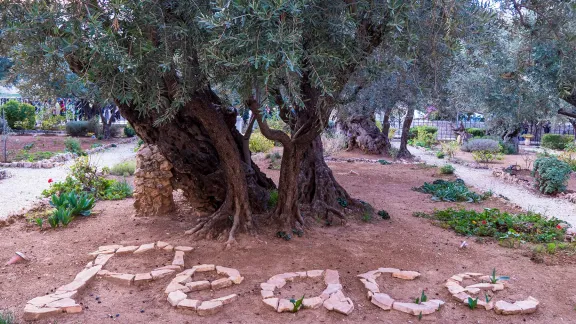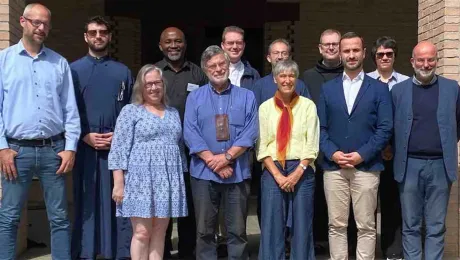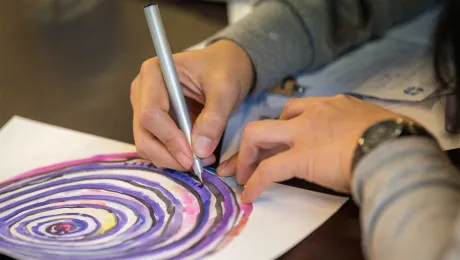
Ancient olive trees in Jerusalem. Photo: LWF/A. Danielsson
Lutheran and Jewish experts highlight urgency of renewing and strengthening relationships in times of polarization
(LWI) - In times of hostility and polarization, the biggest challenge facing people of faith is “to raise up leaders” who can heal divisions and strengthen relationships across the different religious traditions. The importance of this task was shared by Lutheran and Jewish theologians and teachers who came together for a webinar on 16 May entitled ‘Gathering around the Tree of Life.’
Rev. Dr Sivin Kit, the Lutheran World Federation (LWF) Program Executive for Public Theology and Interreligious Relations, moderated the discussion which focused on the urgency of renewing Lutheran-Jewish relations. The event, attended by people of faith from countries around the world, took place as the LWF is preparing a study document to equip member churches to engage more effectively in dialogue with Jewish neighbors in their different national and regional contexts.
Rev. Rivka Schunk, theological research assistant with LWF, welcomed participants, noting that a rise in conspiracy theories during the COVID-19 pandemic has led to an increase in antisemitism in countries across the globe. From its foundation in 1947, she said, the LWF has engaged in dialogue with Jewish communities and there is a growing awareness of the need for self-criticism regarding Martin Luther’s anti-Judaic writings.
Posture of humility and listening
In opening remarks, LWF’s director for Theology, Mission and Justice, Ms Eva Christina Nilsson, observed that the growing numbers of refugees and migrants means that the search for peaceful coexistence within a multifaith context is more urgent than ever before. She noted that “a posture of humility and honesty as we listen and talk with one another” is vital to counteract the antisemitism, Islamophobia and anti-Christian rhetoric which is often used to justify violence against religious communities.
Quoting the words of the late Swedish Bishop Krister Stendhal, Nilsson reiterated the three guiding principles that are needed for genuine interfaith engagement: “let the other [person] define her/himself; don’t compare the best in your own tradition with the worst in the other; find something in the other that you really envy” or admire.
Responding to her remarks, Rabbi Dr Joseph Kanofsky from the Kehillat Shaarei Torah, a modern Orthodox synagogue in Toronto, Canada, recalled the “friendship, goodwill and mutual respect” he experienced in conversations with Lutheran friends as a teenage boy in Washington state in the western United States. Both parents, he noted, encouraged him to be open and develop “a genuine interest in others.”
Kindness, generosity, hope
In the current climate of “misinformation, cancel culture, calling out the mistakes and oversights of the other, whether real or perceived,” Rabbi Kanofsky said, people of faith are called to preserve and share the precious resources of “righteous generosity, kindness and humility” which are in increasingly short supply.
Among the panelists was Rabbi Tamar Elad-Applebaum, founder of the ZION Israeli community in Jerusalem and co-founder of a pluralistic training program for Israeli rabbis. The duty of faith leaders today, she said, is "to bring people together to the Tree of Life, even in the most difficult moments” teaching respect and friendship in a world where people are more often “full of hate and competition.”
The biggest challenges, she continued, are to raise up leaders with friends in different traditions and to offer “a picture of hope” in a world where many experience only despair and mistrust of the other. Noting that she grew up in Jerusalem without encountering any Christians, she said her “most important duty as a rabbi is to model a new kind of public parenting” where people learn to heal their history of hatred and division. “It is upon us,” she said, as guardians of the Tree of Life, to “tend [it] and make sure its roots are deep.”
Self-awareness and self-criticism
Dr Jakob Wirén, associate professor at Lund University and theological advisor to Church of Sweden Archbishop Antje Jackelén acknowledged how “Anti-Judaistic supersessionist theology is so deeply embedded in the Lutheran way of thinking and preaching” that it remains a challenge today “for Christian theology in general and for Lutheran theology in particular.”
But levels of self-awareness and self-criticism are growing in the churches today, he continued, alongside promising "practical work at local level where Jews, Christians, Muslims, Buddhists, they join hands together to fight antisemitism” and other forms of racism or religious discrimination.
Another Jewish panelist, Rabbi Dr David Sandmel, Chair of the International Jewish Committee for Interreligious Consultations (IJCIC), spoke of the significant progress that has already been made over past decades. He recalled a joint document from the LWF and the IJCIC in 1983 and a more recent statement by the Evangelical Lutheran Church in America (ELCA), describing them both as “wonderful resources to reinvigorate the conversation.”
But the challenges remain, Sandmel continued, particularly in updating the curricula of universities and seminaries. Many Jews only know Luther through writings, which have been repudiated by the LWF and ELCA, but they are unaware of the “personal and institutional friendships that have developed” in recent decades. “We need to learn more about our Christian neighbors,” he said, while Christians need to recognize the “visceral emotional impact” of negative portrayals of the Pharisees and other Jewish leaders of antiquity.
It is vital to persist in “correcting our past, refining our theology and teaching our leaders and people” to strengthen relationships and “create a very durable network that we can rely on in times of stress.”
Dr. Esther Menn, Dean of Academic Affairs and Professor of Old Testament/Hebrew Bible at the Lutheran School of Theology at Chicago, spoke of “the shift away from Jewish-Christian relations towards broader interfaith engagement.” But “specialization in this unique relationship” is vital to build on the progress of recent decades, she stressed.
As Lutherans learn more about their roots in Judaism, she said, “they are shocked and ashamed by their complicity in antisemitism” in the past. It is vital to persist in “correcting our past, refining our theology and teaching our leaders and people,” she insisted, as a way of “strengthening actual relationships with Jewish individuals and communities to create a very durable network that we can rely on in times of stress.”
Offering a perspective from outside the European and North American context, Dr Leonard Chrysostomos Epafras, faculty and researcher at the Indonesian Consortium for Religious Studies, spoke of the many challenges facing the “micro-minority” Jewish community in his country, the world’s largest Islamic nation, where Judaism is not recognized among the six officially acknowledged religions.
Epafras noted that despite an antisemitic tone to much of the public discourse, there is a growing curiosity among Indonesians about the history and identity of this tiny Jewish community. South-East Asia’s first Holocaust memorial museum recently opened in North Sulawesi, he said, and the province is also home to what is thought to be the largest permanent menorah in the world.
In closing remarks, Rabbi Josh Standon, spiritual leader of East End Temple in New York city and Senior Fellow at the National Jewish Center for Learning and Leadership, noted that “our best learning” in interfaith relations happens in conversations across geographic time zones, but also across past and future generations.” He highlighted the importance of families teaching children to respect and learn from others, of communities continuing to encounter the complexities of their own past, stressing that only through such conversations is it possible to sow seeds of hope for the future.
LWF/P. Hitchen
Webinar: Gathering Around the Tree of Life


